Personal tools
News from ICTP 92 - Dateline

Two recent announcements have stirred great interest among high energy theoreticians at ICTP and SISSA (International School for Advanced Studies) in Trieste. A series of experiments at CERN in Geneva, Switzerland, have offered evidence of the existence of a new state of matter in which quarks are completely free instead of bound up in more complex particles like protons and neutrons. Such a state must have existed just a few microseconds after the Big Bang. The second announcement, made at the 4th International Symposium on Sources and Detention of Dark Matter in the Universe, recently held in Marina del Rey, California, noted that a team of Italian physicists working at the Gran Sasso Laboratory of the Italian National Institute of Nuclear Physics (INFN) may have uncovered traces of the elusive neutralinos. These weakly interacting massive particles (WIMP) could be the first supersymmetric particles that theoretical physicists have foreseen as candidates for dark matter.
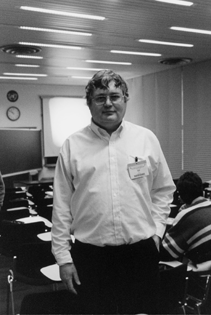
Danish-born physicist Per Bak, a professor at Imperial College in London, opened ICTP's Research Workshop on Self-Organized Criticality and Phase Transitions in Driven Systems with a lecture outlining his views on homogeneity and non-homogeneity in the universe. Bak, a frequent visitor to the Centre, is one of the founding fathers of the science of self-organised critical systems, which emphasises the deeply disruptive, yet self-correcting, forces--such as earthquakes and volcanic eruptions--that seem to drive the Earth's "metabolism." Although Bak's theory remains a controversial tool for understanding the behaviour of natural systems, it has gained a great deal of notice in the field of economics, especially for deciphering the sometimes volatile behaviour of the stock market. Bak's work has attracted the attention of several public officials, including U.S. vice-president and major presidential candidate Al Gore.
The Third World Academy of Sciences (TWAS) has received the Group of 77/United Nations Development Programme (UNDP) award for economic and technical co-operation among developing countries (ECDC/TCDC) for the year 2000. The award is given to institutions or individuals making significant contributions to the promotion of South-South co-operation. Previous recipients include the South Centre, Third World Network, South-North Development Monitor and Eduardo Praslj, chairperson of the Perez-Guerrero Trust Fund for Economic and Technical Cooperation among Developing Countries. UNDP is the largest source of assistance for development and the main body for co-ordinating the United Nations' development work. The G-77, with 133 members, is the largest Third World coalition in the UN. Its goal is to advance the developing world's economic interests and to enhance its negotiating capacity on international economic issues within the UN system.
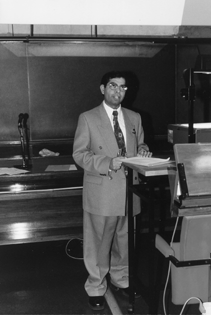
Arbab Ali Khan, assistant professor in the Department of Electronics at Quaid-i-Azam University in Islamabad, Pakistan, is the first recipient of the International Commission for Optics (ICO)-ICTP Prize. The award, established in August 1999, is given to a young researcher who was born and continues to live and work in a developing country. Khan, whose major fields of interest are fibre optics and lasers, was honoured at a special ceremony during ICTP's Winter College on Optics and Photonics. He received US$1000 and a certificate. Comprised of 44 institutions, ICO is dedicated to advancing global knowledge and high-level research findings on optics through conferences, meetings, schools, fellowships and awards. It is an affiliate commission of the International Union of Pure and Applied Physics (IUPAP). IUPAP is a member of the International Council of Scientific Unions (ICSU).
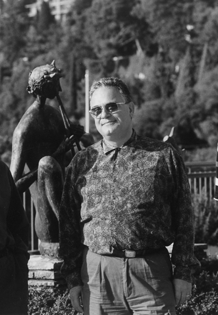
The European Geophysical Society has awarded Giuliano Francesco Panza the Beno Gutenberg Medal. Panza, professor of seismology at the University of Trieste and head of the ICTP Structure and Non-Linear Dynamics of the Earth (SAND) programme, is being honoured for his scholarly achievements in earthquake modelling and for advancing international co-operation in earthquake analysis and prediction. The award, established in 1996, is named in honour of the great German-born seismologist who is credited with discovering the Earth's core and helping to explain the physics of continental drift. The award ceremony will take place in Nice, France, this spring during the opening of the XXV General Assembly of the European Geophysical Society.
Blix Chosen as Chief Inspector
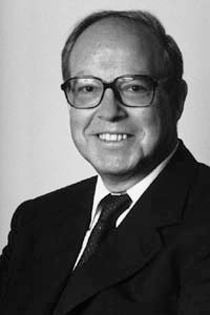
The UN Security Council has chosen Hans Blix to be chief inspector of a new disarmament commission for Iraq. Blix served as director general of the International Atomic Energy Agency (IAEA) from 1981 to 1997--a crucial period in the Agency's history marked by the increasing risks posed by nuclear weapons' proliferation, especially in the developing world, and rising public concerns and controversies following the accident at the Chernobyl nuclear plant in the former Soviet Union. Blix has visited ICTP on several occasions, including the Abdus Salam Memorial Meeting in 1997 and the official ceremony for the transfer of the Centre's management responsibilities from IAEA to UNESCO in 1996.
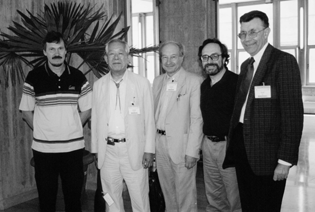
Masatoshi Koshiba at the ICTP 5th School on Non-Accelerator Particle Astrophysics (29 June - 10 July 1998) with (from left) Alexei Smirnov, Giorgio Giacomelli, Miguel Virasoro and Nello Paver.
Masatoshi Koshiba, professor of physics at the University of Tokyo, Japan, and Raymond Davis, professor of physics at the University of Pennsylvania, USA, have been awarded the prestigious Wolf Prize for physics for their investigations of the elusive subatomic particles, neutrinos. The prize citation noted that their findings and observations "have opened a new window of opportunity for the study of astronomical objects, such as the Sun and exploding stars, and the fundamental properties of matter." Koshiba visited the ICTP in July 1998, just a few weeks after the discovery of neutrino's mass in Japan's SuperKamiokande detectors. Koshiba led the detectors' design and construction team. Both he and Davis will receive $100,000. The awards ceremony will take place at the Israeli Knesset (Parliament) on 21 May
ICTP Senior Associate Ghulam Murtaza has been named the first Salam Professor of Physics at Government College in Lahore, Pakistan. The chair was established by the government of Pakistan to honour the memory of ICTP founder and Nobel Laureate Abdus Salam. Murtaza, who was a pupil of Salam at Imperial College in London, recently wrote to the Centre to say that the "Salam Chair is an honour and at the same time a challenge. I hope I will be able to come up to it. And of course I shall need strong support from various quarters, particularly from the Abdus Salam ICTP."